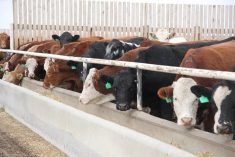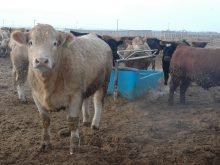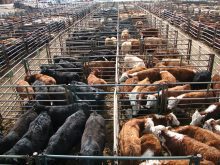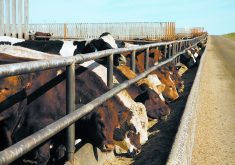This cattle market information is selected from the weekly report from Canfax, a division of the Canadian Cattlemen’s Association. More market information, analysis and statistics are available by becoming a Canfax subscriber by calling 403-275-5110 or at www.canfax.ca.
Fed prices rally
Fed cattle prices have rallied by more than $11.50 per hundredweight since the beginning of November and are now within $8.25 per cwt. of their annual high set in late April. Fed steers averaged $154.14, and fed heifers averaged $153.20 per cwt.
Read Also

Critical growing season is ahead for soybeans
What the weather turns out to be in the United States is going to have a significant impact on Canadian producers’ prices
Last week, cattle that traded to western Canadian packers were being scheduled for the weeks of Dec, 23 and Dec. 30 delivery. With trucks tough to find and limited manpower over the holidays, producers were looking for more money for the extra hassle of having to deliver cattle over the holidays.
Dressed sales were reported from $258-$260 per cwt. delivered, $8-$10 per cwt. higher than the previous week. Even with the jump in prices, sale volumes were light last week, suggesting feedlot inventories are becoming more current. U.S. packer interest was noted. Sales to the United States were reported at US$198 per cwt. delivered. U.S. sales were comparable with local deals. Cattle that traded to the U.S. will be lifted this week.
The Alberta fed cash to futures basis strengthened, going from -$10.98 per cwt. to -$3.55 last week. Western Canadian fed slaughter for the week ending Nov. 30 totalled 37,157 head, the largest slaughter for the end of November since 2005. In addition to big slaughter volumes, Canadian slaughter cattle exports also continue to be large.
Ontario prices have not rallied to the degree Alberta prices have. Dressed sales were reported from $236-$240 per cwt. delivered. Prices are steady with the previous week.
Based on Alberta-Saskatchewan cattle-on-feed data, feedlot placements from May to August were down 88,000 head, which should lend support to the fed market over the next couple of months. Most if not all the cattle that were marketed last week were spring-placed cattle. Many are indicating they will not have any yearlings to market until the New Year.
In the U.S., there was light trade last week in the north at US$188 per cwt. dressed, steady to $1 higher than the previous week. Live sales in the south were ranging from $119-$119.50 per cwt., 50 cents to $1 per cwt. higher than the previous week. With higher cattle prices and lower beef cut-out values, packers have given up some margin.
For the week ending Nov. 23, U.S. steer and heifer carcass weights averaged 911 lb. and 842 lb., respectively. Carcass weights are six to nine lb. heavier than last year. The U.S. hog complex has been dealing with record production and slaughter, and there have been reports of whole hog carcasses being shipped to China to be fabricated. For the month of October, total beef exports were down eight percent in volume and down 11 percent in value compared to last year.
Cow prices firmer
Alberta slaughter cow prices appear to have bottomed and prices last week firmed modestly higher. D2 slaughter cows at auction averaged $81.40 per cwt., up $1.65 per cwt. from the previous week, and D3 cow prices were fully steady, averaging $70.50. Dressed cow bids were around $2-$3 per cwt. higher than the previous week with bids reported from $155-$160 per cwt. delivered. Butcher bull prices eased modestly lower last week, averaging $98.45 per cwt., but seasonally are expected to gain price momentum in the new year.
Western Canadian non-fed slaughter volumes for the week ending Nov. 30 were three percent larger than the previous week at 11,231 head, and year-to-date were two percent larger, totalling 380,406 head. Western Canadian cow slaughter has exceeded 10,500 head over the past three weeks. Good demand is anticipated this week for feeder cows, and strong trim demand should continue into 2020.
Feeders trade steady
Feeder prices traded unevenly steady last week with average steer prices firming modestly higher and heifer prices slipping by 63 cents per cwt. Light steer calves less than 400 lb. continued to see good demand and prices rallied $4.50 per cwt. higher than the previous week. Similar weight heifer prices slid $5.50 per cwt. lower.
Steer calves from 400-700 lb. generally firmed $1-$2 per cwt. higher last week, and heifers trended steady to $1.50 lower. Large steers over 700 lb. to place against the doldrums of the summer fed market saw prices ease modestly lower on seasonally reduced quality and supplies. A good offering of replacement quality heifers over 700 lb. saw prices fully steady to higher.
Weekly Alberta auction volumes were 21 percent lower than two weeks ago at 46,968 head and were 18 percent larger than the same week last year. Year-to-date volumes trended three percent below year ago at 1,555,690 head. The U.S. Department of Agriculture reports that Canadian feeder exports to the U.S. for the week ending Nov. 23 rebounded 55 percent larger than the previous week to 1,840 head.
Time is running out to spend year-end tax money, and good feeder demand is anticipated for the remainder of 2019. Calf prices this week were expected to firm modestly higher, and a limited offering of large feeder steers should be able to hold prices steady. Good demand for quality feeder heifers will continue to shore up the replacement heifer floor. Warm weather and muddy pen conditions encouraged a few southern Alberta feedlots to slow calf placements, which could benefit feeder prices in the new year.
Beef trade
U.S. cut-outs were down US$6.64 per cwt. on Choice and $2.52 per cwt. on Select last week, averaging $225.60 and $208.12, respectively. Demand for holiday items softened, and buyers were expecting added processing capacity now that the Tyson plant in Kansas has started processing cattle again.
Canadian cut-out values for the week ending Nov. 30 saw AAA up $5.44 per cwt. to $299.01 and AA down 37 cents per cwt. to average $273.04. AAA ribs continued to lead the trend with prices up six percent. The AAA/Choice spread narrowed from -$21 per cwt. to – $10. The AA/Select spread narrowed from -$11 per cwt. to -$8.
















